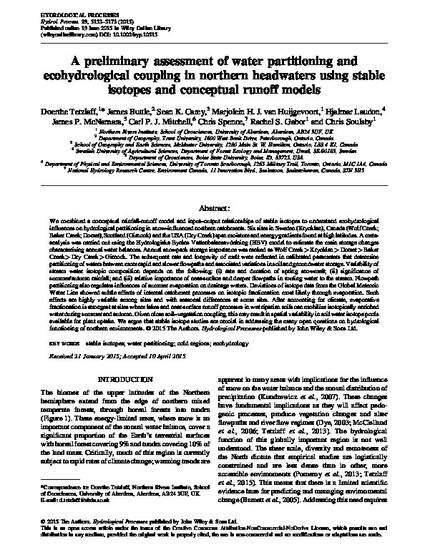
We combined a conceptual rainfall-runoff model and input–output relationships of stable isotopes to understand ecohydrological influences on hydrological partitioning in snow-influenced northern catchments. Six sites in Sweden (Krycklan), Canada (Wolf Creek; Baker Creek; Dorset), Scotland (Girnock) and the USA (Dry Creek) span moisture and energy gradients found at high latitudes. A meta-analysis was carried out using the Hydrologiska Byråns Vattenbalansavdelning (HBV) model to estimate the main storage changes characterizing annual water balances. Annual snowpack storage importance was ranked as Wolf Creek > Krycklan > Dorset > Baker Creek > Dry Creek > Girnock. The subsequent rate and longevity of melt were reflected in calibrated parameters that determine partitioning of waters between more rapid and slower flowpaths and associated variations in soil and groundwater storage. Variability of stream water isotopic composition depends on the following: (i) rate and duration of spring snowmelt; (ii) significance of summer/autumn rainfall; and (iii) relative importance of near-surface and deeper flowpaths in routing water to the stream. Flowpath partitioning also regulates influences of summer evaporation on drainage waters. Deviations of isotope data from the Global Meteoric Water Line showed subtle effects of internal catchment processes on isotopic fractionation most likely through evaporation. Such effects are highly variable among sites and with seasonal differences at some sites. After accounting for climate, evaporative fractionation is strongest at sites where lakes and near-surface runoff processes in wet riparian soils can mobilize isotopically enriched water during summer and autumn. Given close soil–vegetation coupling, this may result in spatial variability in soil water isotope pools available for plant uptake. We argue that stable isotope studies are crucial in addressing the many open questions on hydrological functioning of northern environments.
This document was originally published in Hydrological Processes by John Wiley & Sons Ltd. This work is provided under a Creative Commons Attribution-NonCommercial-NoDerivs 4.0 license. Details regarding the use of this work can be found at: http://creativecommons.org/licenses/by-nc-nd/4.0/. doi: 10.1002/hyp.10515
Available at: http://works.bepress.com/james_mcnamara/49/

For complete list of authors, please see article.